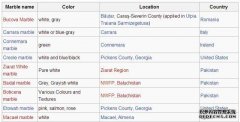Safety in The Production Process of Raw Materials
Europe is the leader of the environmental industry. and this passage is a conversation with Gerd Merke, who is the Secretary General of Euroroc, European and International Federation of Natural Stone Industries.
What is your assessment of the 2010 Mineral Conference which took place this past June in Madrid?
Gerd Merke: First of all I want to congratulate our Spanish friends that they managed to host such a conference. I know how difficult it is to get the stakeholders of raw materials to a meeting. What impressed me most was the fact that quite a few of industry leaders came to the conference as well. So it was not only a meeting of scientists and representatives of federations, but as well of people close to the market and decision makers of the industry.
What are the main aspects of the Madrid Raw Materials Declaration 2010 which has emerged from the Mineral Conference?
Each group and each person has different aspects in mind. For me the most important aspect is that the public must understand that we need and should love raw materials. They are the basis of our standard of living and if we are not willing to use the resources we will have considerable problems. Of course I would have loved that the focus was on natural stone, but this is a dream. Important is that our industry is a passenger on the train of raw materials. Some of my colleagues may feel that their product is first class like the producers of lithium necessary for the electric car battery and the public agrees. This may be, but we can argue that our quarries do not cause any damage to the environment. We are first class in respect to a sustainable life cycle.
Can you tell us what criteria were used for establishing the list of the 14 basic raw mineral materials with respect to their economic importance and the risks for supply shortage? Why, as was recommended, is it important to review the list every five years?
One may ask for the logic of the list, but this not the decisive issue. People do not recall the materials of the list, but only the fact that raw materials are important. Why every five years a new list? We take decisions today to our best knowledge, but maybe we are wrong and know it only five years later. Nothing is sure today, only the fact that nothing is sure.
Availability of raw materials is vital for the future and the competitiveness of EU industries. But how can this be combined with respect for the environment?
If Europe is the leader of something in the world then it is the environmental industry. Nowhere in the world we find more safety in the production process of raw materials. Sometimes we suffer from an awful lot of bureaucracy, but on the whole we are a winning team. It is true that the low standard especially in some Asian countries may give those countries some advantage in the international competition, but we do not want to follow this line, it would be a vicious circle. It would be however a big help if the member states improved the general set-up of the raw materials industry.
Looking at the policies on sustainability implemented by the companies within the sector, what can you tell us about advances in the Red Natura 2000?
If you look to Red Natura 2000 in Spain you see considerable area under it. Our problem is that the Commission thinks that Natura 2000 does not mean that one is not allowed to continue quarrying and enlarge the area. Unfortunately the local authorities see it often quite differently. Our goal and work of Euroroc is a better information process. This is a challenge in our daily work.
What role is there for recycling of mineral waste? Will it be an important issue in the future?
The handling of waste is already a central issue. There are various directives and papers on this subject already in force and under discussion. Other raw materials still have a long way to go, but natural stone has done its homework. Stone is part of a sustainable circle.
Each Member State needs to develop its own Raw Material Policies within its national, regional and local areas to guarantee appropriate access to raw materials. Is this achievable within the framework of a common policy for the different EU Member States?
This is a smart question. There is not such thing called European citizen, we still have our national identity. A member does not want to exploit its raw materials for the sake of other countries. You saw this feeling during the financial crisis. Some countries like Germany was not fond of helping Greece and Slovakia did not even approve the aid for Greece. It is a long way to Rome, but we do our best.
Why do you think there has been an attitude change in EU institutions with regard to raw materials? Does EU policy reflect increased sensitivity and concern for this issue?
First of all: unfortunately the European Union was last seeing the issue. China has smart decision makers: they buy everything available on the market from Africa to Australia. Like a colleague from the aggregates industry put it: “The EU is terribly inefficient, but it helps to overcome nationalism in Europe. It makes a war impossible”. Now, is this not a first success?
How do you expect the European Commission to pronounce on the Proposals arising from the Madrid Mineral Conference?
The Commission does not move by itself. Euroroc and the other federations are in a permanent discussion with the EU authorities, an ongoing process that needs support from the industry and the stakeholders in the member states.
How can society be made aware of the need of the industries to access mineral resources, and that such action is not construed as negative to the interests of citizens?
There is a saying: “No pain, no gain”. It is a permanent process explaining things to people. They want all a marble bathroom or restore their stone cathedral, but no quarry in my backyard. In Stuttgart, Germany, Green activists are protesting the necessary modernization of the railway and the building of a new train station, experts think that it is necessary. Whenever you do something in Europe you have to lobby first and mediate resistance.
What are the main objectives of Euroroc’s work? What are its major demands?
Let me put it into one sentence: We want to work. For this purpose we need security and a clear set of rules by the authorities that allows our industry to open a quarry within reasonable time and a friendly atmosphere for our industry. A new quarry is an investment and this is positive for our industry. We will only overcome the crisis by doing something and not by avoiding something new to come.
Monthly Recommendation
Recommended News







